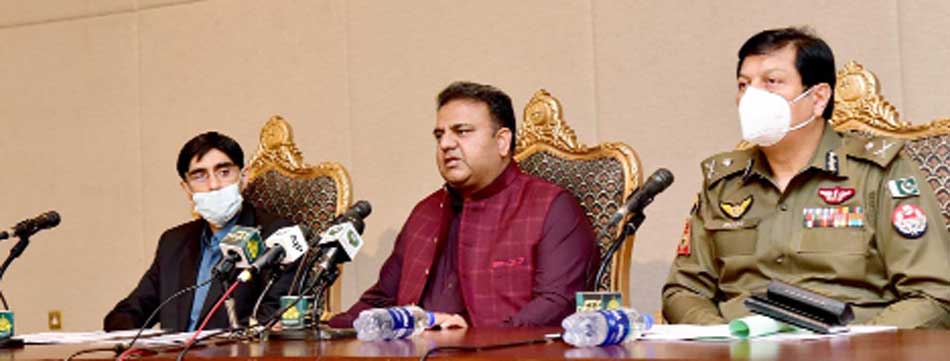
ISLAMABAD: National Security Advisor Dr Moeed Yusuf has said that initial investigations into the recent terrorist attack in Lahore have provided concrete evidence of Indian involvement in terrorist activities in Pakistan.
Dr Moeed Yusuf said this while addressing a joint press conference along with Minister for Information and Broadcasting Fawad Chaudhry and Inspector General of Police Punjab, Inam Ghani here on Sunday.
Dr Moeed said the mastermind and handlers of the blast have been identified through forensic analysis of the electronic equipment recovered from the terrorists involved in the incident. He said, “We have absolutely no doubt that the main mastermind of the blast is an Indian national, who belongs to the Indian intelligence agency RAW.”
“I want to make sure that our message is heard very clearly that this particular incident on 23rd of June in Lahore we have concrete evidence and intelligence including financial and telephone records that point to direct Indian sponsorship of these terrorists,” said Dr Moeed.
Appreciating Pakistani agencies’ effective role in apprehending the culprits involved in the Lahore blast, Dr Moeed said that right after the incident, thousands of attempts of cyberattacks against Pakistan’s critical investigation structure were made to deflect attention of police and security agencies to avoid apprehension. “Our cyber security is strong enough that we were able to thwart these attempts,” he added
The advisor said that Prime Minister Imran Khan has instructed his team to use all possible legal and political means to get to the people outside Pakistan who are part of this international terrorist network. He said, “We will share all information with international community and expose the nefarious designs and real of face of the state in our neighbourhood that is constantly sponsoring terrorism against our innocent civilians.”
Dr Moeed Yusuf urged the international community to stop turning a blind eye towards India’s illegal actions and play its legally binding role for the safety of innocent Pakistanis if it really believes in peace and stability in this region.
The NSA also said the India “drama” of drone attack in Indian Illegally Occupied Jammu and Kashmir (IIOJK) is an attempt to divert attention from the Lahore attack. “I would also like to point out that there has been a whole drama about some mysterious drones flying here and there in IIOJK. What was the logic is now very clear and again with confidence we can put it out that was deflection tactic trying to divert the attention of the world from the fact and they knew at that time we have not only apprehended culprits but we knew exactly what it had been done behind the scene and who was behind it.”
The NSA further said India has been using territory and people of “third countries” to carrot terrorist attacks in Pakistan, although he did not mention those countries by name.
Speaking on the occasion, IGP Inam Ghani said that Punjab Police, Counter Terrorism Department and other law enforcement agencies successfully investigated the case and unearthed the plan.
He said that Peter Paul David was the linchpin of the Lahore blast who is a Pakistani citizen and resides in Karachi. The IGP said that Peter Paul David arranged the car to be used for the blast.
Ghani said that Eid Gul, an Afghan refugee, installed the vehicle-borne improvised explosive device in the car and drove it from Islamabad to Lahore. He said the people involved in the incident tried to escape but due to prompt action of law enforcement agencies, they could not get enough time.
The conversation between the terrorists on telephone was also released in the news conference.
On June 23, a powerful blast near the residence of banned Jamaatud Dawa chief Hafiz Saeed in Johar Town killed three people and injured 24 others, including a police constable.
Meanwhile, there are no longer backdoor contacts with India to resume the long-stalled talks between the two nuclear neighbours, said National Security Adviser Dr Moeed Yusuf.
The contacts have been abandoned because New Delhi failed to take any confidence-building measures, mainly the reversal of its August 2019 move on Indian Occupied Jammu and Kashmir (IIOJK), said Dr Moeed while talking to a private news channel.
“It’s over now,” Yusuf said, adding it was New Delhi that approached Islamabad for resumption of talks.
“It was India that approached us. They (New Delhi) said they wanted to talk on all disputed issues, including on Kashmir,” he said without specifying the time period and location of the contact.
“We clearly conveyed to them our demand i.e. reversal of Aug. 2019 move, for resumption of talks,” he went on to say.
“Since they [the Indian government] haven’t done anything [favourable] in this regard, it’s over now,” he said, foreseeing “no change” in India’s stance on the August 2019 move.
“India is trapped in IIOJK after taking this step. It’s in their own interest to reverse it,” he further argued.
Commenting on last week’s meeting of pro-Indian Kashmiri politicians with Indian Prime Minister Narendra Modi, Moeed said New Delhi has failed to convince even its own allies over the controversial IIOJK move.
“They [politicians] too openly demanded the revocation of the August 2019 step and asked Prime Minister Modi to talk to Pakistan [over the Kashmir issue],” he contended.
On August 5, 2019, the Indian government revoked Article 370 and other related provisions from its constitution, scrapping the country’s only Muslim-majority state with its autonomy. It was also split into two federally administered territories. Simultaneously, it locked the region down, detained thousands of people, imposed movement restrictions and enforced a communications blackout, according to Amnesty International.
Islamabad, in turn, suspended trade ties and downgraded diplomatic relations with New Delhi.
The top intelligence officials of the two nuclear-armed neighbours reportedly met in the United Arab Emirates (UAE) in January in an attempt to stem heightened tensions between the two sides.
In April, UAE’s Ambassador to the US Yousef Al Otaiba confirmed that Abu Dhabi was mediating between New Delhi and Islamabad to help reach a “healthy and functional” relationship.
In March, the two militaries agreed to honour the 2003 ceasefire along the LoC, followed by an exchange of letters between the two premiers, which was widely viewed as an outcome of the reported backdoor diplomacy. – TLTP






